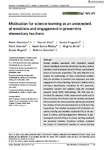Motivation for Science Learning as an Antecedent of Emotions and Engagement in Preservice Elementary Teachers

Use this link to cite
http://hdl.handle.net/2183/29363
Except where otherwise noted, this item's license is described as Atribución-NoComercial-SinDerivadas 4.0 Internacional
Collections
- Investigación (FEDU) [938]
Metadata
Show full item recordTitle
Motivation for Science Learning as an Antecedent of Emotions and Engagement in Preservice Elementary TeachersAuthor(s)
Date
2021Citation
Membiela, P., Vidal, M., Fragueiro, S., Lorenzo, M., García-Rodeja, I., Aznar, V., Bugallo, A., & González, A. (2022). Motivation for science learning as an antecedent of emotions and engagement in preservice elementary teachers. Science Education, 106, 119– 141. https://doi.org/10.1002/sce.21686
Abstract
[Abstract] Several variables associated with motivation toward science learning in preservice elementary teachers, such as relevance to personal goals and self-efficacy, are important factors in preservice preparation. The main objective is to analyze the relationships of these motivational variables with the emotions of boredom and enjoyment, and with engagement in science learning. Data were obtained with a self-report questionnaire completed by 871 preservice elementary teachers and analyzed using the structural equation model (SEM) methodology. The first step determined the adequacy of the measurement model and, in the second step, SEM showed that the variables associated with motivation for science learning significantly predicted the variance of boredom and enjoyment as 27% and 52%, respectively. The variables associated with motivation for science learning and emotions explained 67% of the variance in science learning engagement. Relevance to personal goals and self-efficacy in science learning predicted the emotional variables. Emotional variables mediated the impact of motivational variables in science-learning engagement. The fundamental role of emotions in motivation and science-learning engagement in preservice elementary teachers is observed.
Keywords
Emotions
Engagement
Motivation
Preservice elementary teachers
Science learning
Engagement
Motivation
Preservice elementary teachers
Science learning
Editor version
Rights
Atribución-NoComercial-SinDerivadas 4.0 Internacional






